Saint Paul
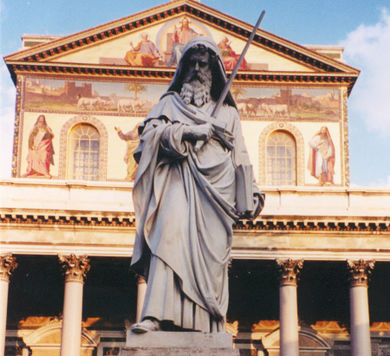
The ascended master Hilarion was embodied as Saul of Tarsus, who became the apostle Paul after his encounter with Jesus on the road to Damascus.
Early life
Paul was a citizen of Cilicia (a Roman province of Asia Minor), a learned Jew brought up in Jerusalem at the feet of Gamaliel, who was a Pharisee of the council and a doctor of the law.
Paul was a persecutor of Christians and consented to the heartless stoning of Stephen recorded in the Book of Acts. However, though the mind of Saul was prejudiced against Christ (by hereditary and environmental factors that cannot permanently alter the soul’s direction except the soul give consent), the image of the apostle Paul, his fiery destiny, was already etched within his spirit.
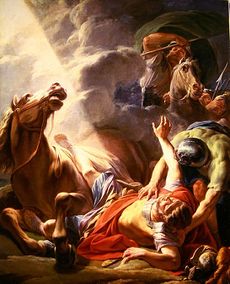
Conversion
The Book of Acts describes the turning point in Paul’s life:
And as he journeyed, he came near Damascus: and suddenly there shined round about him a light from heaven: and he fell to the earth, and heard a voice saying unto him, “Saul, Saul, why persecutest thou me?”
And he said, “Who art thou, Lord?” And the Lord said, “I am Jesus whom thou persecutest: it is hard for thee to kick against the pricks.”
And he trembling and astonished said, “Lord, what wilt thou have me to do?” And the Lord said unto him, “Arise, and go into the city, and it shall be told thee what thou must do.”... And he was three days without sight, and neither did eat nor drink.[1]
One of Jesus’ disciples, Ananias, following the Lord’s directions to the street called Straight, entered the house where Paul was staying “and putting his hands on him said, ‘Brother Saul, the Lord, even Jesus, that appeared unto thee in the way as thou camest, hath sent me that thou mightest receive thy sight and be filled with the Holy Ghost.’”[2]
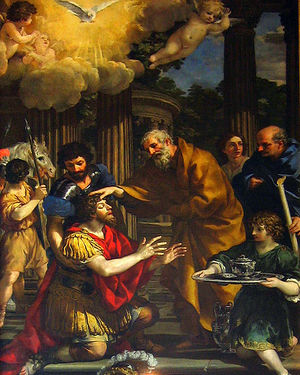
By the act of this messenger, Paul had the immediate proof that the voice he had heard midst the blinding light was none other than that of Jesus himself. Thus, it is recorded that through the Lord’s instrument, Ananias, “immediately there fell from his eyes as it had been scales; and he received sight forthwith, and arose, and was baptized.”[3]
In his own words Hilarion speaks of the great turning point in his life as Saul of Tarsus through the intercession of the Saviour:
That Great Doctor of the Law, the Lord himself, who appeared to me on the road to Damascus, allowed even me to experience that blindness that accrues from the dead ritual of the untempered zealot.
He took away my blindness to the things of the Spirit. Ah, indeed I was blind to the light indwelling in his chosen disciples. So great had been the darkness in me that I must persecute that light that was about to swallow up the whole ... philosophy of Serpent and his seed. How my soul longed to be rescued, though I knew it not!
Of the same measure that I fought with fury the light that would deliver me was my longing to be free. It was a question of polarization. And when men are polarized to the anti-Christ position, if they be truly of God and of Christ who is All and in all—though they deny him, yet by his Holy Spirit he will repolarize them out of the deadness of their words and more words unto the Alpha and Omega of the living Word.
Oh, how I love that Christ who is All and in all! O thou Great Deliverer of my soul, I walk the earth in the power of thy love seeking my instruments through whom I might convey that conversion of the Holy Ghost that came upon me in the encounter with my Lord.
He chose me as an ensample. Yea, the tears yet stream upon my face when I think of my former estate, the proud Saul of Tarsus.[4]
Retreat into the Arabian Desert
Following his conversion to Christ, Paul was taught by Jesus himself in preparation for his mission. We read in his letter to the Galatians—and he stressed this—how he did not receive his knowledge of Christ’s message from the other Christians of the day:
The fact is, brothers, and I want you to realize this: the Good News I preached is not a human message that I was given by men, it is something I learned only through a revelation of Jesus Christ....
God, who had specially chosen me while I was still in my mother’s womb, called me through his grace and chose to reveal his Son in me, so that I might preach the Good News about him to the pagans. I did not stop to discuss this with any human being, nor did I go up to Jerusalem to see those who were already apostles before me, but I went off to Arabia at once and later went straight back from there to Damascus.”[5]
Many have speculated as to what Paul did during his sojourn in the desert. Hilarion has explained that Jesus took him in his higher consciousness “with others into his retreat over the Holy Land and at Arabia. I have been there and learned of him. And this was my desert sojourn in meditation with him, taken up as I was in my finer bodies and trained directly heart to heart.”[6]
Paul’s “thorn in the flesh”
On his return from Arabia, Paul began his mission of preaching the gospel. During these early years, he had a spiritual experience that left its mark on him for the rest of his life. He describes this in his second letter to the Corinthians:
It is not expedient for me doubtless to glory. I will come to visions and revelations of the Lord.... And lest I should be exalted above measure through the abundance of the revelations, there was given to me a thorn in the flesh....
For this thing I besought the Lord thrice, that it might depart from me. And he said unto me, “My grace is sufficient for thee: for my strength is made perfect in weakness.” Most gladly therefore will I rather glory in my infirmities, that the power of Christ may rest upon me.
Therefore I take pleasure in infirmities, in reproaches, in necessities, in persecutions, in distresses for Christ’s sake: for when I am weak, then am I strong.[7]
Bible commentators have long speculated on what Paul’s “thorn in the flesh” could be. Many believe it was an illness or physical disability. In any case, this infirmity was no sign of God’s weakness, but it was the sign of our ever-present helplessness, lest we should think that by some attainment we are above any other, lest we should begin to rest upon innate powers instead of the innate power of the Almighty God.
In reality, we all have our “thorn in the flesh” that we have been given to bear in this life. It keeps us humble and it helps challenge us to rise to new levels of self-mastery.
Missionary journeys
To what end was the conversion of this Saul of Tarsus? Clearly, it had to have been for a very special purpose that the Master Jesus personally undertook the tutoring of Paul, whose experiences and writings in Christ dominate the New Testament.
In Truth, his mission was to build Christ’s Church upon the Rock of his personal encounter with the Lord—to convert the “Gentiles,” their leaders, and the children of light and to elucidate Christ’s Person and Presence as the living Saviour in sermons and letters delivered throughout Asia Minor and the Mediterranean over a period of thirty years.
It was from the city of Antioch that Paul was called to the first of his missionary journeys, which took him through the southern part of Asia Minor. Paul performed miracles and preached the gospel, but the Jews were angered by his preaching; in Lystra he was stoned and left for dead by a mob.
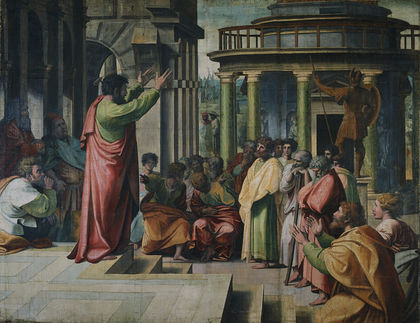
Paul’s second journey took him farther through Asia Minor and across the Aegean Sea, where he established Christianity’s first foothold in Europe with the formation of a church in the Roman colony of Philippi in Macedonia.
This journey also took Paul to Athens, where he discoursed daily in the marketplace. Certain philosophers of the Epicurians and the Stoics called him a babbler because he spoke of Jesus and the resurrection. They took him to Mars’ Hill, where the elders of the city met, so that they might hear from him concerning “this new doctrine.” Paul then gave a clear and elegant speech to the intellectual, erudite Athenians.
Then Paul stood in the midst of Mars’ hill, and said, “Ye men of Athens, I perceive that in all things ye are too superstitious. For as I passed by, and beheld your devotions, I found an altar with this inscription, TO THE UNKNOWN GOD. Whom therefore ye ignorantly worship, him declare I unto you....
“Forasmuch then as we are the offspring of God, we ought not to think that the Godhead is like unto gold or silver, or stone, graven by art and man’s device. And the times of this ignorance God winked at; but now commandeth all men every where to repent: because he hath appointed a day, in the which he will judge the world in righteousness by that man whom he hath ordained; whereof he hath given assurance unto all men, in that he hath raised him from the dead.”
And when they heard of the resurrection of the dead, some mocked: and others said, “We will hear thee again of this matter.” So Paul departed from among them.[8]
After leaving Athens, Paul spent a year and a half preaching in Corinth. Jesus appeared to him in a vision, saying, “Be not afraid, but speak, and hold not thy peace: for I am with thee, and no man shall set on thee to hurt thee: for I have much people in this city.”[9] There was a great response to Paul’s message here: “Many of the Corinthians hearing believed, and were baptized.”[10]
Paul imprisoned
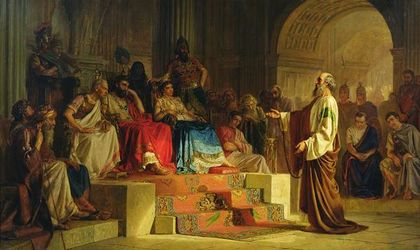
Following his third missionary journey, Paul desired to return to Jerusalem to preach the gospel to the Jews, and he did so despite Jesus’ warning to him not to go there. However, “The Jews which were of Asia, when they saw him in the temple, stirred up all the people, and laid hands on him, crying out, ‘Men of Israel, help: This is the man, that teacheth all men every where against the people, and the law, and this place: and further brought Greeks also into the temple, and hath polluted this holy place.’”[11]
They caused an uproar in the city and would have killed Paul had he not been taken into custody by the Romans. When a conspiracy to kill him was exposed, Paul was sent to Caesarea, where Felix, the governor of Judea, imprisoned him for two years. Paul appealed his case to Caesar, and was therefore sent to Rome to stand trial.
The taking up of serpents
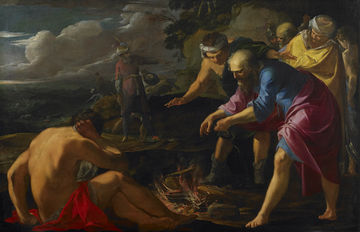
In the midst of the journey to Rome, Paul’s ship was overtaken by a great storm and shipwrecked on the island of Melita. Sanat Kumara describes Paul’s experience there:
Our story begins in the cold and rain by a kindled fire on the island of Melita midst the people who received the shipwrecked Paul and his companions with no little kindness. Paul himself had gathered a bundle of sticks and laid them on the fire; and there, out of the heat, came a viper and fastened on his hand.
The barbarians, when they saw the venomous beast hanging on the hand of Paul, being superstitious, said among themselves, “No doubt this man is a murderer whom, though he hath escaped the sea, yet vengeance suffereth not to live.”[12] But Paul, the beloved, empowered of the Holy Ghost, shook off the beast into the fire and felt no harm. And the barbarians, seeing no harm come to him, changed their minds and said that he was a god....
And others in the island which had diseases came to the beloved apostle and were healed by the laying on of hands—because the Lord Jesus Christ and the angel of God stood by him....
Now be of good cheer and be encouraged by the great courage of those who have gone before you. Claim the mantle of the apostle Paul who awaits your coming on the east gate of the City Foursquare where he is the Lamb who is worthy to open the book that is reserved for the initiates of the fifth ray. Serving with the two witnesses, these witness unto the Truth, in order that the original lie of Serpent and all liars that have proceeded after him might be swallowed up by the rod of Moses, by the judgment of the Son of God, by the sacred fire of the Holy Ghost, and by the Light of the Woman clothed with the Sun.[13]
Paul finally arrived in Rome, where, according to church tradition, he died a martyr’s death sometime during the reign of the emperor Nero (A.D. 54–68).
The Guru-chela relationship
Paul’s direct and touching relationship with his Lord shows the intended friendship and personal initiatic path Jesus holds for every one of us—once we allow ourselves to be fully converted (the word means “turned around, transformed as a new creature in Christ”) and subject unto the Universal Christ in life and death and eternity.
We can gain many insights into the Guru-chela relationship by studying the life of Paul. We see that Jesus worked with him, talked with him. Jesus warned him, for instance, against going to Jerusalem.[14] Paul went anyway, got himself in trouble—Jesus rescued him again. It was a living interaction where the disciple heard his master but said, “Nevertheless, I want to do this.” The master gave him his free will.
Paul learned by trial and error. The master allowed him to learn by his mistakes. He did not condemn him. It was a working relationship of compassion and love and growth, whereby Jesus desired Paul to put on the elements of his own Christhood.
Jesus, the Guru, has given us these insights into the path of his chela, Paul:
Therefore, see to it also, in thy preparation for our calling, that you bring therefore a live coal, a lively coal of fire and fervor for the Truth as you understand it. For this was the quality of heart of Saul of Tarsus—believing what he had been taught, even a false teaching regarding Jesus Christ, my own name and my life and mission.>
Therefore, he persecuted my followers and, in them, persecuted my Presence. For I was in them, and my light was an offense to those who therefore enlisted Saul in their ways of exterminating, imprisoning, persecuting and torturing Christians.
Blessed hearts, realize, then, that the fervent heart when hitched to the wrong star may be unhitched and redirected and therefore scale the heights of mastery, leaving behind those who seek to perfect themselves by the Law without the Spirit, who engage in rituals without love, and who are mechanistic in their judgments, very eager to point the gnarled and bony finger against any lightbearer for a single sin that they do think does soil the garment.
Well, sin may or may not soil the garment. But the Holy Spirit is able. And that Holy Spirit in me did raise up Saul, and therefore he received upon himself that substance of his karma that created the state of blindness. And my instrument again, Ananias, therefore did pronounce that he should see by that Holy Spirit—and he did see.
And Saul therefore became Paul and went forth as a chief apostle, one that I would send to the Gentiles. And yet he, being a Jew, determined to preach to the Jews, not realizing how infamous and how wicked was the core of their hatred and their rage against the living Christ. Thus, I came. Though he did not take my advice, so he loved me, and I comforted him and gave to him protection, even through the Romans.
And you see, therefore, that God is no respecter of persons, and we of the ascended hosts may raise up friends of light where you know not.[15]
Hilarion’s remembrances of his life as Paul
The ascended master Hilarion has given us some insights into his life and calling as Saint Paul:
Jesus the Christ we called him, and we were called of him as you are called this day. I recall the memories of his coming to me, empowering me with his Word.
Yet first he humbled me on that road to Damascus, the humbling I sorely needed that I might bow to my own Christ flame that he revealed to me, as he also gave to me the key of meditation upon that flame that I might walk in his footsteps on the fifth ray of science and healing and apostleship and the preaching of the Word.
Often I felt like the hands and the feet and the heart of Hercules, wrestling with the downward spirals of the earth with their atheism, their agnosticism, their intellectual pride and rancor against the prophets and the Holy One of God so recently come into our midst. Yet, all the while I remembered I was once counted among them. To have been once so proud and so deliberate against the will of God would forever burn in my memory the helplessness that we all have in essaying to be instruments of God.
But the great empowering by the Word comes in the hour of the conversion. It is not the hour of the call, but the hour of the conversion when the soul answers with something that is deep. It is the flowing, it is the giving, it is that surrender when, as He said, “It is hard for thee to kick against the pricks....”[16]
My soul knew Him as of old and recalled to my outer mind the memory of the inner vow. It was not the first time I had seen the Lord Christ. I had seen him before taking incarnation, and yet I had to work through that pride, that karma on the fifth ray of much learning, much studying and superiority in social and intellectual standing that I had in regard to the early Christians. And so it was my own karma that was upon me whereby I was resisting the call.[17]
Paul learns the inner mysteries
Through his epistles and his missionary journeys, Paul set up a rule and an order for the administration of the churches that he established. But he also taught to initiates the inner, sacred mysteries and a path of initiation.
During his time in Arabia, the apostle came as close as he could to the etheric retreat of Jesus and communed with Jesus, who gave to him the mysteries—mysteries that Paul said it was “not lawful for a man to utter.”[18] Jesus gave him the inner keys to life—teachings that are being unveiled only today, teachings far ahead of his time, teachings that were a gnosis, or self-knowledge—the hidden wisdom of the inner Christ: “Christ in you, the hope of glory.”[19]
Thus, by stages Paul put on the mantle of his Lord and accomplished His works as His instrument in healings, miracles, prophecies, preaching and fiery conversions. This was the true path Christ meant his apostles to walk—as the ascended master Hilarion once told us:
If the light that is in thee be filled with the momentum of God and if the gears of the chakras be oiled with the holy oil of Gilead, then by the very vibration of your life you can intensify the currents of God, you can be one with God, you can be God incarnate as Jesus Christ was.
This is what I learned from him as he became my inner and outer Guru. This is what I understood: that I, too, could become the Christ as the instrument of the Saviour—that where I walked he would walk, that where I stood he would heal, that where I spoke he would speak. This I learned, and yet I understood the unworthiness of the lesser self in the state of sin that is made worthy by grace, by transmutation, by fiery baptism and by the balancing of karma in service to Life.[20]
Another life is required
Paul rendered a great service in that life, and he was one of those most influential in spreading Jesus’ message throughout the Roman world. However, before his conversion Paul had consented to the stoning of Saint Stephen (the first Christian martyr) and had actively persecuted and killed Christians. It is often the case that the taking of life in one incarnation requires another embodiment to balance that karma, or debt to life; and therefore Paul did not ascend at the conclusion of that life.
Thus Jesus, who raised up Paul to be his apostle, sponsored him in a final incarnation as Saint Hilarion (c. A.D. 290 to 372), the founder of monasticism in Palestine. His was the soul of Paul come again for his final incarnation to fulfill the law of balancing his karma incurred in the persecuting of Christians and the consenting to their death.
The ascended master Hilarion has explained why he was required to embody again before making his ascension:
Remember, then, that we, the apostles of Christ, did come under the dispensation of the Law that required one balance 100 percent of one’s karma ere the soul enter the ascension in the light.[21] Thus, I was required to atone in my life as the apostle Paul and in my next life as Saint Hilarion for the sins I had committed before I received my Lord.[22]
See also
For more information
Chapters on Lord Lanto in Mark L. Prophet and Elizabeth Clare Prophet, Lords of the Seven Rays.
Elizabeth Clare Prophet, Hilarion the Healer: The Apostle Paul Reborn.
Sources
Elizabeth Clare Prophet, Hilarion the Healer: The Apostle Paul Reborn, pp. 22–43.
- ↑ Acts 9:3–9.
- ↑ Acts 9:17.
- ↑ Acts 9:18.
- ↑ Hilarion, “A Door of Utterance,” Pearls of Wisdom, vol. 23, no. 5, February 3, 1980.
- ↑ Gal. 1:11–17, Jerusalem Bible.
- ↑ Hilarion, October 7, 1990, “Preach the Gospel of Salvation in Every Nation!” Pearls of Wisdom, vol. 33, no. 39, October 7, 1990.
- ↑ II Cor. 12:1, 7, 8–10.
- ↑ Acts 17:22–23, 29–33.
- ↑ Acts 18:9–10.
- ↑ Acts 18:8.
- ↑ Acts 21:27–28
- ↑ Acts 28:4.
- ↑ Elizabeth Clare Prophet, The Opening of the Seventh Seal: Sanat Kumara on the Path of the Ruby Ray, pp. 271, 272.
- ↑ Acts 21:4, 11–14.
- ↑ Jesus, April 3, 1983, “The Glorification of the Son of God,” Pearls of Wisdom, vol. 26, no. 35, August 28, 1983.
- ↑ Acts 9:5.
- ↑ Hilarion, December 29, 1976, “The Personal Saviour, The Personal Guru,” in Mark L. Prophet and Elizabeth Clare Prophet, Lords of the Seven Rays, book 2, pp. 171–73.
- ↑ II Cor. 12:4.
- ↑ Col. 1:27.
- ↑ Hilarion, December 29, 1977, “Transference of the Healing Flame,” in Mark L. Prophet and Elizabeth Clare Prophet, Lords of the Seven Rays, book 1, pp. 203–4.
- ↑ In Paul’s time, individuals were required to balance all of their karma before qualifying for the ascension. Since the inauguration of the New Dispensation early in the twentieth century, it has been possible to ascend having balanced at least 51 percent of one’s karma, the remaining portion being balanced on inner levels after the ascension.
- ↑ Hilarion, “The Revolution of Truth.”
